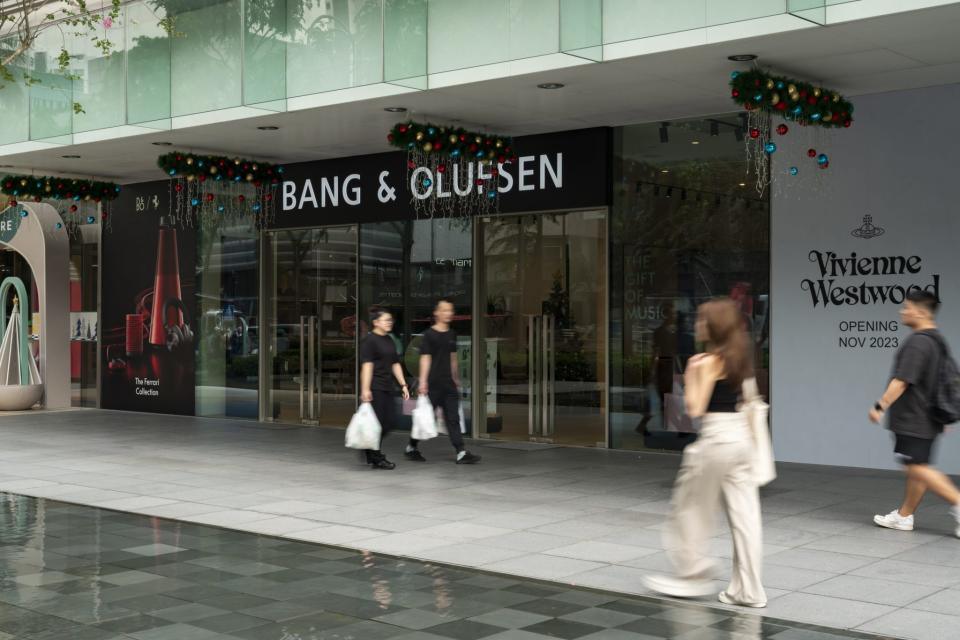Luxury audio brand that sells $139,000 speakers says it will beat the economic slowdown because ‘the rich will only become richer’

The luxury slump has become one of the biggest phenomena of a tight 2023. The rich are splurging less, and luxury retailers from LVMH to Gucci and Balenciaga are all getting caught in the riptide.
But at least one company believes it can get ultrarich shoppers to keep buying its products and defy the proclaimed end to the “roaring ’20s.”
The head of Bang & Olufsen—a Danish company famous for its high-end home entertainment gear—is confident the group will beat a recent economic downturn because the rich will keep adding to their wealth.
Speaking to the Financial Times, Bang & Olufsen CEO Kristian Teär said his company was on track to keep selling to his customers for one simple reason.
“The rich will only become richer,” Teär told the FT.
“We know they want to also express themselves, and they don’t want to have what everybody else has.”
Bang & Olufsen sells pricey speakers, televisions, headphones, and sound bars. Its most expensive item is a set of £110,000 ($139,000) Beolab 90 speakers. Customers can also buy Ferrari-branded headphones for £1,150 ($1,455), or splurge on a folding, oak-accented television worth £21,150 ($26,775).
Revenues for the group fell nearly 7% last year to around $400 million as demand in its crucial China market slowed amid sustained COVID-19 lockdowns.
However, the group beat expectations with its latest earnings as revenues and profits once again increased, buoyed by price rises and the sale of higher margin products, demonstrating demand from higher-end shoppers.
End of the ‘roaring ’20s’
The past year has seen a steep slowdown in luxury purchases in what is being dubbed the end of the latest “roaring ’20s.”
Gucci owner Kering posted a fall in revenues in its last quarterly earnings, joining companies like LVMH, Burberry, and Balenciaga in struggling to keep sales stable amid a tough macroeconomic environment.
The watch sector hasn’t been spared either, with the price of Rolex and Patek Philippe timepieces falling to two-year lows in November. The slowdown in the sector prompted the CEO of Swiss watchmaker Audemars Piguet to suggest the widespread splurge experienced in 2020 and 2021 was an anomaly that wouldn’t be seen again.
Meanwhile, companies like LVMH have been forced into a minor strategy shift amid the slowdown. The group, run by Bernard Arnault, diversified into entry-level sunglasses.
However, while those groups have been competing with each other for a shrinking pool of luxury shoppers, Teär told the FT his group has the advantage of being the only one of its kind to sell its products.
“In audio luxury, there is nobody else,” Teär said.
Teär is also eager to try to sell to millennials and Gen Z shoppers who have disposable income and want to furnish their homes with well-designed tech.
Indeed, a recent surge in shoppers opting for Bang & Olufsen products may also be a sign of the growing trend of “stealth wealth,” where ultrarich shoppers opt for innocuous purchases of everything from baseball caps to light switches that are well out of reach for the typical consumer.
The trend indicates a movement away from demand for the more overtly luxurious items marketed by the likes of Gucci and LVMH.
However, while coming across as rightfully bullish after its latest earnings, Bang & Olufsen’s bet that wealthy consumers will continue to opt for eye-watering price tags is a strategy that has hurt the company in the past.
Shares in the group plunged in 2019 and have struggled to recover since as customers failed to buy the group’s $15,000 televisions, after tech reviewers pointed out they could get similar-quality TVs at a much lower price point.
This story was originally featured on Fortune.com

 Yahoo Finance
Yahoo Finance 